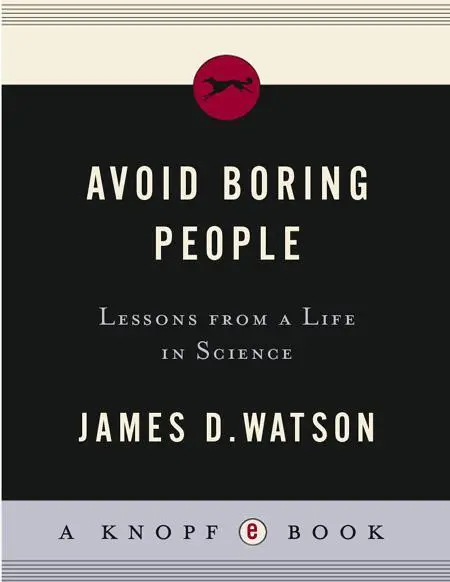James Watson - AVOID BORING PEOPLE - Lessons from a Life in Science
Здесь есть возможность читать онлайн «James Watson - AVOID BORING PEOPLE - Lessons from a Life in Science» весь текст электронной книги совершенно бесплатно (целиком полную версию без сокращений). В некоторых случаях можно слушать аудио, скачать через торрент в формате fb2 и присутствует краткое содержание. Жанр: Биографии и Мемуары. Описание произведения, (предисловие) а так же отзывы посетителей доступны на портале библиотеки ЛибКат.
- Название:AVOID BORING PEOPLE: Lessons from a Life in Science
- Автор:
- Жанр:
- Год:неизвестен
- ISBN:нет данных
- Рейтинг книги:5 / 5. Голосов: 1
-
Избранное:Добавить в избранное
- Отзывы:
-
Ваша оценка:
- 100
- 1
- 2
- 3
- 4
- 5
AVOID BORING PEOPLE: Lessons from a Life in Science: краткое содержание, описание и аннотация
Предлагаем к чтению аннотацию, описание, краткое содержание или предисловие (зависит от того, что написал сам автор книги «AVOID BORING PEOPLE: Lessons from a Life in Science»). Если вы не нашли необходимую информацию о книге — напишите в комментариях, мы постараемся отыскать её.
AVOID BORING PEOPLE: Lessons from a Life in Science — читать онлайн бесплатно полную книгу (весь текст) целиком
Ниже представлен текст книги, разбитый по страницам. Система сохранения места последней прочитанной страницы, позволяет с удобством читать онлайн бесплатно книгу «AVOID BORING PEOPLE: Lessons from a Life in Science», без необходимости каждый раз заново искать на чём Вы остановились. Поставьте закладку, и сможете в любой момент перейти на страницу, на которой закончили чтение.
Интервал:
Закладка:

ALSO BY JAMES D. WATSON
The Molecular Biology of the Gene
(1965, 1970, 1976, coauthor: 1987, 2003)
The Double Helix: A Personal Account of the
Discovery of the Structure of DNA (1968)
The DNA Story: A Documentary History of
Gene Cloning (coauthor: 1981)
Recombinant DNA (coauthor: 1983, 1992, 2007)
The Molecular Biology of the Cell
(coauthor: 1983, 1989, 1994)
A Passion for DNA: Genes, Genomes,
and Society (2000)
Genes, Girls, and Gamow: After the
Double Helix (2002)
DNA: The Secret of Life (2003)

For Paul Doty
Contents
FOREWORDPREFACE
1. MANNERS ACQUIRED AS A CHILD
2. MANNERS LEARNED WHILE AN UNDERGRADUATE
3. MANNERS PICKED UP IN GRADUATE SCHOOL
4. MANNERS FOLLOWED BY THE PHAGE GROUP
5. MANNERS PASSED ON TO AN ASPIRING YOUNG SCIENTIST
6. MANNERS NEEDED FOR IMPORTANT SCIENCE
7. MANNERS PRACTICED AS AN UNTENURED PROFESSOR
8. MANNERS DEPLOYED FOR ACADEMIC ZING
9. MANNERS NOTICED AS A DISPENSABLE WHITE HOUSE ADVISER
10. MANNERS APPROPRIATE FOR A NOBEL PRIZE
11. MANNERS DEMANDED BY ACADEMIC INEPTITUDE
12. MANNERS BEHIND READABLE BOOKS
13. MANNERS REQUIRED FOR ACADEMIC CIVILITY
14. MANNERS FOR HOLDING DOWN TWO JOBS
15. MANNERS MAINTAINED WHEN RELUCTANTLY LEAVING HARVARD
EPILOGUE
CAST OF CHARACTERS
REMEMBERED LESSONS
Foreword
Robert Maynard Hutchins once famously remarked that whenever he felt the urge to exercise, he immediately lay down. Despite the hyperbole (for he, like Jim Watson, was an ardent tennis player) he had made the point that his priority resided in one relentless form of exercise, that of the mind. In this, too, Jim Watson is a true follower of Hutchins, as his book and indeed his life demonstrate so engagingly.
Under the leadership of Hutchins, the University of Chicago played a significant role not only in Jim's education, but as a permanent benchmark in his continuing thinking about education. If one of the principal goals of a liberal education is to leave students with an insistent lifelong preoccupation with the question of what education is for and what it is about, what qualities should characterize the truly educated person and what intellectual virtues should be sought and practiced—and why—then Jim is a triumphant example of its success. Hutchins was the great critic of and innovator in twentieth-century higher education. He made his university the home of perhaps the most passionate debates over curriculum and intellectual purpose to take place in recent memory. And Hutchins, like Jim, was never satisfied: his university, he said, might not be very good, but it was the best there was. For undergraduates, “the best” had to do with a vision of general education that introduced students to the most profound questions of human life and civilization, and to the great writers and thinkers who had confronted and tried to make sense of them—an education that taught students to think with rigor and integrity and to go on doing so under whatever circumstances they might encounter.
The budding ornithologist who entered Chicago's college left as a man ready to embark on the study of the gene, focused on an ambitious specialization while always underlining the need to sustain the widest possible intellectual curiosity. The imperative that Jim Watson had learned to embrace was to pursue the most difficult, perhaps intractable, problems and to think scrupulously and express his views honestly, whatever might be the consequences in terms of what is now called “political correctness,” other kinds of mere conformity and self-interest, or even politesse.
The austerity suggested by such an outlook does not, fortunately, preclude a fine sense for the enjoyment of the world, its pleasures and its foibles. Jim portrays himself as a very young and rather monastic undergraduate and as something of a late, and utterly enthusiastic, social bloomer. The freshness and candor of his observations on people and events, accomplishments and follies (including his own) may well derive from the novelty he found in every experience that, new to him, made life ever more interesting.
This combination of qualities shone through The Double Helix as it does here, and indeed Jim's account of the struggle to get the manuscript published more or less intact is almost as entertaining as the book itself. And just as The Double Helix became a classic in showing how science may really get done, so the present volume, in describing the whole trajectory of a unique career within a larger world of science and research, will join it and add to our understanding of Jim Watson's revolutionary achievements.
The different sides of Jim Watson's persona emerge vividly also from the “remembered lessons” detailed at the end of each chapter. Some may prove more useful than others. The advice to “Expect to put on weight after Stockholm” is not, alas, relevant for most readers, but “Work on Sundays” does have larger application. So, too, the wisdom of “Don't back schemes that demand miracles.”
The maxim “Don't use autobiography to justify past actions or motivations” defines the captivating tone of this autobiography and its direct self-revelation quite wonderfully. At the same time, the exhortation “Avoid boring people” is scarcely necessary, for if Jim Watson is incapable of anything, it is of boring people.
In consequence, we must all be grateful to Jim for so exuberantly following his own lesson: “Be the first to tell a good story.”
— Hanna H. Gray, University of Chicago
Preface
Most of my unpublished writerly output—handwritten manuscripts and letters, lectures and lab notes, university and government documents that I helped prepare—is deposited in the archives of Harvard University and of Cold Spring Harbor Laboratory. In time, it will all become available to the public, mostly through the Internet, for those preternaturally curious about how I have moved through life. Rather than let other commentators have the first crack at those writings, I opted to be the first to employ them extensively to prepare this look at my life before middle age became obvious—my childhood, university years, career as an active scientist and professor, and my first years as director of the Cold Spring Harbor Laboratory.
As this book's broad features came to cohere, I began to see Avoid Boring People as an object lesson, if not quite an exemplary history of the making of a scientist. It is my advice in the form of recollections of manners I deployed to navigate the worlds of science and of academia. The thought that this instructive value might be made explicit in the form of self-help led me to conclude each chapter with a set of “remembered lessons”—rules of conduct that in retrospect figured decisively in turning so many of my childhood dreams into reality. Suffice it to say, this is a book for those on their way up, as well as for those on the top who do not want their leadership years to be an assemblage of opportunities gone astray.
Читать дальшеИнтервал:
Закладка:
Похожие книги на «AVOID BORING PEOPLE: Lessons from a Life in Science»
Представляем Вашему вниманию похожие книги на «AVOID BORING PEOPLE: Lessons from a Life in Science» списком для выбора. Мы отобрали схожую по названию и смыслу литературу в надежде предоставить читателям больше вариантов отыскать новые, интересные, ещё непрочитанные произведения.
Обсуждение, отзывы о книге «AVOID BORING PEOPLE: Lessons from a Life in Science» и просто собственные мнения читателей. Оставьте ваши комментарии, напишите, что Вы думаете о произведении, его смысле или главных героях. Укажите что конкретно понравилось, а что нет, и почему Вы так считаете.












